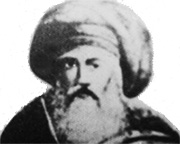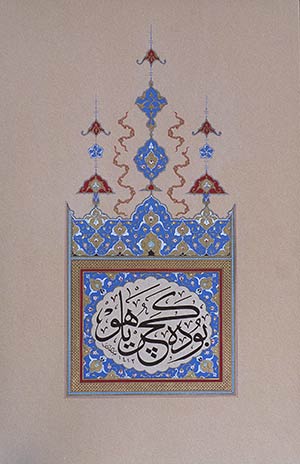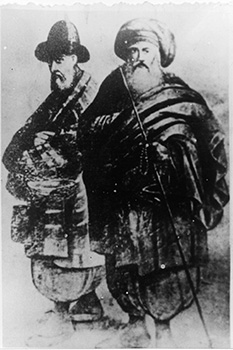Shaykh Ahmed er Rifai Biography
Seyyid Ahmed er Rifai was born in the first half of Rajab in the Muslim year of 512 AH (1119 CE) on a Thursday. His birthplace was in the town of Ummu Abeyde, in the township of Beta, in the province of Basra, Iraq. Hz. (for Hazreti, meaning the Honorable) Ahmed Rifai passed to the other side on Thursday, Jamadi al-Awwal 22, 578 AH (1183 CE), in the town of Wasit, in Basra, Iraq. His father was Seyyid Ali Abul Hasan. His mother was Fatima ul-Anseri bint Yahya Nijjeri. His Shaykh was Aleyyul Vasiti. His maternal uncle, who helped raise him, was Shaykh Mansur Rabbani.

Ahmed Rifai was related by blood to Prophet Muhammad (peace be upon him) on both his father’s and mother’s sides. His paternal lineage was Seyyid Ahmed er Rufai, Ibni Seyyid Ali, Ibni Seyyid Yahya, Ibni Seyyid Sabit, Ibni Seyyid Hazim, Ibni Seyyid Ali, Ibni Seyyid Ebilmekerim Rufael Hasanulmekki, Ibni Elseyyit Mehdi, Ibni Esseyyit Mehmet Ebi Kasim, Ibni Esseyyit Elhasan, Ibni Esseyyit Elhuseyin, Ibni Esseyyit Ahmet, Ibni Esseyyit Musa ul-Sani, Ibni Esseyyit Imam Ibrahimulmurtaza, Ibni Imam Musa-ulkazim, Imam Jaferi Sadik, Ibni Imam Muhammad Bakir, Ibni Imam Zeynelabidin, Ibni Imam Husayn, Ibni Emirulmuminin Ali Al Murtaza.
Before Ahmed Rifai’s birth, his maternal uncle, a famous shaykh, Mansur Rabbani, had a vision of our Prophet Hz. Muhammad (pbuh) and was told that his sister would have a male child who would be famous and be known by the name “Rifai.” When the child reached the proper age for Sufism, he should be sent to Shaykh Aleyyul Vasiti for education and training.
Ahmed Rifai’s father passed away when his son was 7 years old. Seyyid Ali died in 519 AH and was buried in Baghdad. Ahmed Rifai’s maternal uncle started taking care of the little boy. After a while he was sent to Shaykh Vasiti in accordance with his uncle’s vision. Ahmed Rifai showed ability and wisdom beyond his age when he began his education under Shaykh Vasiti. He acquired a high maqam (spiritual station) by explaining the book of the Shafi school called Tanbih. Shaykh Mansur said that all during Ahmed Rifai’s stay with him, he saw many miracles come through the boy and that many blessings came through him for everyone.

One of the most widely known miracles associated with Hz. Shaykh Rifai is the one that give him the name Abul Alemeyin (Father of Two Banners). In the year 555 AH, when he was 43 years old, Hz. Rifai went on hajj (pilgrimage). He didn’t wear the usual traveling clothes of seyyids, or the relatives of the Prophet [pbuh] (seyyids were recognizable by their clothing). There is a certain section of the Prophet’s (pbuh) tomb in Medina that only blood relatives of the Prophet (pbuh) may enter. The guard at the door would not allow him in, as he wanted to have proof that Ahmed Rifai was related to the Prophet (pbuh). Hz. Rifai became downhearted and called out towards our Prophet’s (pbuh) tomb, “As-salaamu alaykum, ya jeddi (Peace be on you, my ancestor).” Our Prophet (pbuh) answered, “Walaykum salaam, ya waladi (And peace be on you, my son).” Muhammad’s (pbuh) hand came out of the tomb, and our Pir kissed the Prophet’s (pbuh) hand. When people saw this miracle, they went into a state of wajd (ecstasy) and began stabbing themselves with their swords and knives. When the ecstasy passed, there were people lying all about covered with blood, and Ahmed Rifai returned them to their normal health. After that, our Pir was famous for possessing this gift.
Shaykh Ahmed Rifai is known as one of the four major aqtab-i erbaa (qutbs of the time, which is the highest spiritual station after the prophets and messengers). Another major qutb was his cousin Abdul Qadir al Geylani.
One day someone asked Abdul Qadir Geylani “Ya Hazreti (O Honorable Sir), what is love?” Hz. Geylani told the person to go ask this question to Seyyid Ahmed er Rifai. After sending Hz. Geylani’s salaams (greetings of peace) to Hz. Rifai, he asked, “What is love?” When Ahmed Rifai heard this question, he stood up, saying, “Love is fire, love is fire.” He began whirling until he disappeared into the unseen. When the person saw this, he was disturbed because he didn’t understand what was happening. At that moment, the spiritual presence of Abdul Qadir Geylani appeared and told him to look for the spot from where his cousin Ahmed Rifai had vanished, and to pour rosewater on that spot. The person did this, and within a couple of moments Seyyid Ahmed Rifai appeared, whirling in the exact same place. When the man went back to Baghdad, he visited Hz. Geylani, who asked him, “Did you see love? My brother Seyyid Rifai has reached stations that many walis (protecting friends; saints) have not been able to reach.”
Seyyid Ahmed Rifai also deeply loved and respected Abdul Qadir Geylani and told his students that whoever visited Baghdad without visiting Hz. Geylani’s tomb would not be welcome by Allah or by them.

Abu Musa al Haddadi said that in the town of Haddadiye there was a woman whose children were always stillborn. This lady said, “If I have a child, I will give this child to the service of Ahmed Rifai.” A few years later she had a daughter who was hunchbacked and lame, and the other children in the village always made fun of her. One day, Ahmed Rifai was visiting this town and all the villagers went to the road to see him. The little girl threw herself at Rifai’s feet and cried out, “You are my mother’s Shaykh; please heal me from these problems!” and wept. When Hz. Rifai saw her situation he cried as well, and praying over her, he placed his hands on her back and head. The girl’s back and leg were both healed. This is why Ahmed er Rifai is called Beynennas or Abul Arca, the Father of the Lame.
One Friday, Hz. Rifai was sleeping and woke to find that it was time for prayer. However, there was a cat asleep on his robe. He asked his wife for some scissors, cut off the part of his robe where the cat lay, and stood up and went to prayers. When he returned, the cat had awakened and left, so he asked his wife for thread to sew the robe back together. When he saw his wife’s displeasure at what he had done to his robe, he said “Do not worry, nothing but goodness happened and I did not suffer because of this; this was a good thing.”
Once, Ahmed Rifai spent forty days caring for a dog with leprosy in the wilderness. When he returned and was asked why he had spent so much time caring for an unclean beast, he replied, “When I die and meet my Maker, what would I have said if He asked me why I hadn’t helped one of His creatures?”
